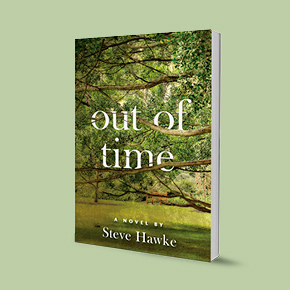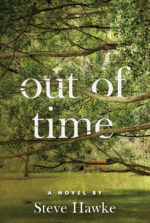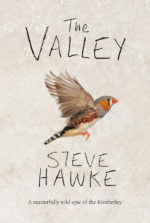Fremantle Press novelist Steve Hawke talks families, tackling difficult themes and his writing process

Steve Hawke’s first novel, The Valley, received such critical acclaim when it was first published in October last year that it’s now on its third print run.
This month saw the publication of Steve’s second novel with Fremantle Press, Out of Time, which tells a very different story. In Out of Time, architect Joe is diagnosed with early onset Alzheimer’s disease, and must make a number of difficult choices about when, where and how he will manage his inevitable decline.
Despite the dark themes of the book, it’s a compelling, and often funny, read. Here, Steve explains his reasons for exploring this topic through family relationships, the challenges he faced in exploring these themes and his own writing process.
What inspired Out of Time? Where did that particular storyworm come from?
I’m not sure that ‘inspired’ is exactly the right word. I spent an awful lot of time thinking about a very personal dilemma. It was/is hypothetical in one sense, but nonetheless very real. At one level, writing this book is my attempt to work that dilemma through.
Leo Tolstoy famously wrote, ‘All happy families are alike; each unhappy family is unhappy in its own way.’ At the risk of being presumptuous, I’m afraid that on this point I must disagree with the great man. The paths to happiness, and the models for happiness in relationships and among families are, I would suggest, infinitely variable. And personally, I find these intricacies – the habits and accommodations and strategies of couples and families, who find ways to make things work – more interesting and more rewarding to explore than the other side of the coin.
Out of Time deals with a lot of dark, often difficult themes. Did you find it difficult or draining to write about these things?
It certainly had its moments. The book does go to some dark places, but the essential answer to the question is no. In a novel you are free to explore the doubts as well as the certainties; the joys of life as well as the fears. Every individual will have a different response, a different answer to the circumstances they have to deal with, and who is to say that one is right and the other is wrong?
I try to be true to each of the main characters in the book without passing judgement on any of them, and in a sense it was liberating and exciting to go through this journey with each of them, and see where they finished up.
What’s your writing process? Can you be working on two projects at once or do you wait until one is finished before starting the next?
Who has the luxury of focusing on one thing at a time in this modern world? Two? Try three or four or more at once. I’m still doing publicity for my last book, The Valley, talking about Out of Time, and there are two new books jostling for space in my head.
When I am deep in the writing of a new book, the process is pretty straightforward. Turn up at the desk each day, and often each night, and do your best to lose yourself in the world and characters you are creating, and find the words. When that’s done, you embark on all the other stages, of rewrites, edits, polishes. It is a profession. It is a job. You do the work.
How did you become a writer? Was it a conscious decision or just something you fell into?
More the latter than the former. The first book I wrote, Noonkanbah, way back in the 1980s (yes, I’m that old) was written because it was a story that needed to be told. In doing it, I discovered that I enjoyed the complex, challenging process of telling a story in all its intricate detail. So I’ve kept on doing it, whenever I’ve had the chance, and whenever I’ve felt there is a story that needs to be told.
Many writers these days opt to do degrees or qualifications as a way in. What do you feel is the best way to get into the industry?
There isn’t a ‘best way’. It’s a mixture of talent, happenstance and application. It’s a game where supply exceeds demand. Degrees and qualifications; I don’t have any, so I’m not really qualified to say. They may come in useful for the day job you need to take to stay alive while you write, but how much they help you as a writer? God only knows.
Do you think that someone can be taught how to be a good storyteller?
Probably not. I know some bloody good yarnspinners – verbal storytellers – who couldn’t write a story to save themselves. And there are people who are elegant creators of prose, but don’t have a good story to tell.
Out of Time and The Valley by Steve Hawke are available online at www.fremantlepress.com.au and from all good bookstores.
Where to see Steve:
New Norcia Writers’ Festival 2019, Saturday 24 August. $80, book online.
In conversation with editor Naama Grey-Smith at Victoria Park Library on Tuesday 27 August at 6 pm. Tickets $3, book online.
Kimberley Writers Festival, Friday 6 – Sunday 8 September. Free, book online.
In conversation with Glynn Greensmith at Strange Editions, Strange Company, Tuesday 24 September. Free, booking essential.




